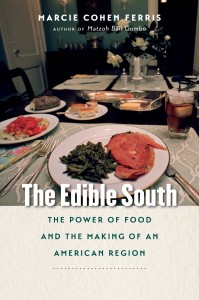
Marcie Cohen Ferris (photo by Kate Medley)
FOOD FOR ALL
Professor of American Studies Marcie Cohen Ferris co-chairs the food theme steering committee with Alice Ammerman of UNC’s Center for Health Promotion and Disease Prevention. We asked Ferris about everything from using food as a lens to examine history to stereotypes about Southern food to her own go-to comfort meal. She has taught and conducted research on food as American culture and the foodways and material culture of the American South.
Q: Why does food make a great topic for this interdisciplinary focus, and what makes UNC uniquely positioned to address this issue?
A: What topic could be more foundational to a university that grapples with the challenges and problems of contemporary life in North Carolina and the world, as well as the great societal issues experienced by past generations and those that will follow us?
UNC has been a leader in food studies for decades. In the 1920s, sociologist Howard Odum, who founded the South’s first department of sociology and School of Public Welfare at UNC, introduced the discipline of “regional sociology,” which brought the tools of social science to bear on the contemporary problems of the South. Diet, or the “food habits” of Southerners, was chief among these concerns. In the same era, UNC folklorists, scholars in public health, physicians and UNC Press editors also focused on regional culture, including foodways. Today, food studies is a vibrant field of interdisciplinary study across the University.
Q: What strengths do faculty, students and alumni from the College of Arts and Sciences bring to the table?
A: Continuing the table metaphor, our faculty, students and alumni are the best dinner guests imaginable! They bring intellectual verve from American studies, African, African American and diaspora studies, American studies, Southern studies, folklore, anthropology, archaeology, art, communication, documentary studies, environmental studies, geography, global studies, history, literature, philosophy, political science, public health, public policy, sociology, theology, biology and women’s studies to the study of food. Given the interdisciplinary nature of UNC’s American studies department and its signature strengths in Southern studies and folklore, UNC is uniquely positioned to expand food studies throughout the University and the region.
Today, UNC students can create a food studies major or minor through the interdisciplinary studies degree program. Food studies in the College is experiencing explosive growth.
Q: You co-taught the new course “Carolina Cooks, Carolina Eats” (watch a video) with your American studies colleague Sharon Holland last spring. For their undergraduate capstone projects, students fanned out across the state to document the history and challenges of North Carolina’s food landscape. Tell us about the oral history interviews they conducted.
A: Our “Carolina Cooks, Caroilna Eats” students interviewed North Carolina cider makers, coffee roasters, molasses makers, coastal innkeepers, potato farmers, produce distributors, dairy farmers, fishermen, bakers, millers, café owners, chefs, fishmongers and barbecue masters. These interviews will be incorporated in our book project on North Carolina foodways and will find a permanent archival home in the Southern Oral History Collection in UNC’s Wilson Library. Here are a few highlights:
- Jeff Hare, Atlantic Seafood, Goldsboro. Hare has been in business for 21 years and sources his fish solely from independent fishermen from the N.C. coast.
- Lee Gliarmis, Dick’s Hot Dog Stand, Wilson. Founded in 1921, Dick’s is one of the oldest family-owned restaurants in North Carolina, providing quick, tasty, inexpensive meals to tobacco and farm workers for decades. It remains a popular venue with locals and tourists alike.
- Bob Nutter, Maple View Farm, Hillsborough. Students learned about how the farm has evolved from a small dairy operation to an in-house bottling plant, the creation of Maple View ice cream, and the formation of a new agriculture education center.
 Q: In your book, The Edible South: The Power of Food and the Making of an American Region (UNC Press, 2014), you use food as a lens to examine the South’s complex history. What unique insights can we gain by using food as our window into that world?
Q: In your book, The Edible South: The Power of Food and the Making of an American Region (UNC Press, 2014), you use food as a lens to examine the South’s complex history. What unique insights can we gain by using food as our window into that world?
A: Food is history. Food is place. Food is power. When we examine the historical arc of food in the American South, we encounter the tangled interactions of its people over time, a world of relationships fraught with conflict, yet bound by blood and attachment to place. The contradiction between the realities of plenty and deprivation, of privilege and poverty in Southern history resonates in the region’s food traditions.
Q: What stereotypes would you like to dispel when it comes to notions of “Southern food”?
A: Fried chicken, biscuits and pitchers of sweet tea — the caricatures of Southern foods are so “super-sized,” enriched, sweetened and filled with butter that these iconic foods have become unrecognizable to native Southerners. Consider the Southern larder of seasonal fruits and vegetables — greens, ramps, butter beans, homemade preserves and pickles, oysters, shrimp, cured hams, pork for the pit, stone-ground grits, peanuts, Carolina Gold rice, roasted sweet potatoes, a piece of hot cornbread. Southern food is a distinctive, innovative cuisine that is grounded in the world of local agrarian traditions and the influence of global cultures.
Q: What foods shaped your own family history and identity? What’s your go-to comfort food when you sit down for a favorite meal?
A: Each year during the December holidays, my husband, UNC historian Bill Ferris, and I visit his childhood home in Vicksburg, Miss., where he grew up on a farm. There we enjoy a familiar Southern meal of field peas, collard greens, sweet potatoes and fried catfish, with hot cornbread served on the side. Talk about eating your history! That is one of my favorite Southern meals. Another of my favorite holiday meals — brisket and noodle kugel — represents my roots of growing up in a small, but dedicated, Jewish community in northeastern Arkansas.
Interview by Kim Weaver Spurr ’88
Read more stories about the work of faculty and students around the food theme.
Read a profile of Ferris in George Washington University (GW) Magazine.
And check out a behind-the-scenes look at our magazine cover shoot!
